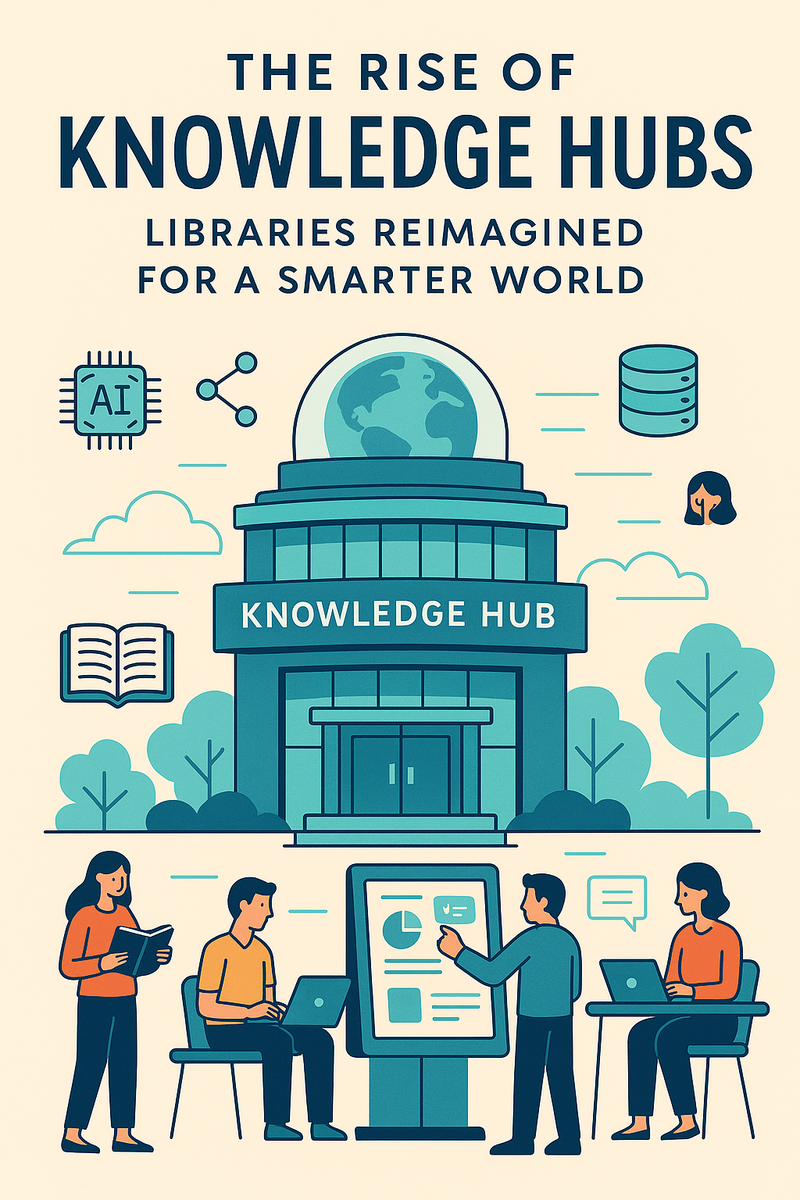
In a time where information is a driving force behind economies, innovation, and societal development, traditional libraries, documentation centers, and information resource facilities are experiencing a significant evolution. The 21st century has introduced a new concept: the Knowledge Hub. These dynamic, interconnected spaces are rapidly becoming indispensable institutions worldwide, appearing in academic settings, government offices, corporate environments, and non-profit organizations. They represent an enhanced version of our conventional information centers, tailored to meet the needs of a rapidly changing knowledge-based economy (World Bank, 2012).
What constitutes a Knowledge Hub?
A knowledge hub is more than just a collection of books or documents. It is a dynamic ecosystem created to gather, organize, store, share, and collaboratively generate knowledge across various fields, industries, and generations. Unlike traditional libraries that focused mainly on physical materials, knowledge hubs integrate digital repositories, learning platforms, real-time collaboration tools, multimedia archives, and even artificial intelligence resources to enable efficient access and meaningful knowledge utilization (UNESCO, 2021).
These hubs combine the essential elements of libraries, research centers, data repositories, innovation labs, and training centers, evolving them into centers of continuous learning, creativity, and collaboration (McKinsey Global Institute, 2019).
Features that Define a Knowledge Hub
A well-developed knowledge hub includes:
- Digital Library Services: Providing access to e-books, journals, multimedia resources, and open educational content.
- Learning Platforms: Integration with Learning Management Systems (e.g., Moodle, Canvas) for continuous education and training.
- Content Management Systems: Used for organizing, archiving, and retrieving institutional knowledge, research, and grey literature.
- Collaboration Tools: Enabling real-time communication, video conferencing, and knowledge-sharing among global teams.
- Data Visualization and Analytics: Converting complex data into actionable insights for improved decision-making.
- Artificial Intelligence and Search Optimization: Offering personalized knowledge retrieval and recommendation engines.
- Community and Networking Spaces: Providing physical and virtual environments for dialogue, peer learning, and interdisciplinary exchange.
Why the World Needs Knowledge Hubs
The global proliferation of knowledge hubs is not accidental—it is a response to genuine, urgent needs.
1 Bridging the Knowledge Divide: Given significant disparities in access to quality education and information, knowledge hubs function as equalizers. They offer open, multilingual, and inclusive access to reliable resources, enabling rural, marginalized, and underserved populations to overcome obstacles.
2 Empowering Institutions and Professionals: Whether in universities, government offices, businesses, or NGOs, professionals require current, pertinent knowledge to stay competitive and efficient. Knowledge hubs consolidate institutional memory, streamline information dissemination, and support intelligent policies and strategies.
3 Driving Innovation and Research: Knowledge hubs serve as think tanks and incubators where data intersects with ideas. By promoting interdisciplinary collaboration and offering tools for research and innovation, they inspire new solutions to existing and emerging challenges.
4 Preserving Cultural and Intellectual Heritage: These hubs also function as digital guardians of a country's intellectual heritage. By digitizing and categorizing local languages, indigenous knowledge, and community stories, they safeguard cultural diversity and foster a sense of identity.
5 Supporting Future Generations: Knowledge hubs provide flexible, blended learning environments tailored to modern learning preferences for students and young people. Through access to curated resources, mentorship, and collaborative initiatives, future generations can develop into empowered global citizens.
Looking Ahead
As we progress further into the Fourth Industrial Revolution, where artificial intelligence, big data, and cloud computing influence every industry, knowledge hubs are essential for resilience, innovation, and informed citizenship (Schwab, 2016; Deloitte, 2022). Governments are increasingly incorporating them into their digital transformation strategies, universities are integrating them into their research ecosystems, and even small organizations are recognizing the importance of organizing their internal knowledge to stay adaptable and future-proof.
For this revolution to be truly inclusive, it is essential for global stakeholders to prioritize the establishment of knowledge hubs in developing countries, rural areas, and conflict zones. Key investments in open-source technologies, digital literacy, multilingual access, and institutional capacity building are crucial for this endeavor (UNDP, 2021; Open Knowledge Foundation, 2020).
In conclusion
Knowledge hubs signify the evolution of libraries into dynamic systems that facilitate connections between individuals, ideas, and future prospects. They are not merely beneficial but rather essential for navigating the complexities of the present and unlocking the potential of tomorrow. Let us foster this development to ensure that every community, both local and global, can harness the power of organized knowledge.














